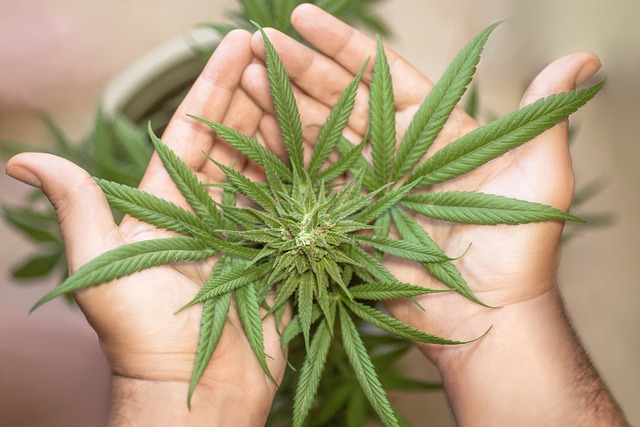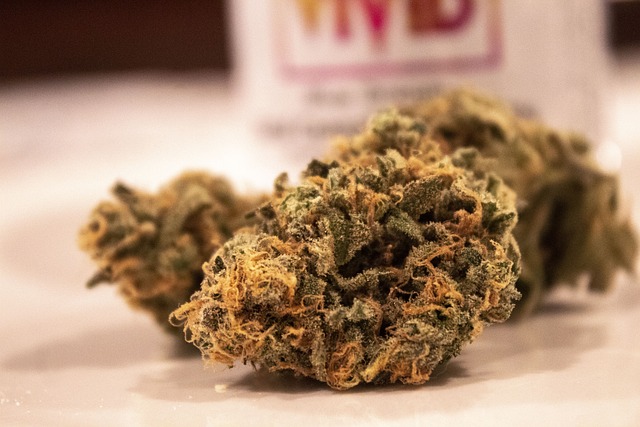THCA (Tetrahydrocannabinolic Acid), a cannabinoid found in the cannabis plant and the precursor to THC, has become a prominent wellness supplement in Alaska due to its legal status and potential therapeutic properties. Despite being federally legal under the 2018 Farm Bill as part of hemp-derived products with less than 0.3% THC, THCA's status in Alaska is regulated alongside high-THC cannabis under state laws. Since the legalization of adult-use cannabis in 2014, there has been a rise in the availability and interest in THCA flower, which offers a clear-headed high and the therapeutic effects of cannabinoids without intense psychoactivity. Anecdotal evidence suggests that THCA may possess anti-inflammatory and neuroprotective benefits, fueling Alaskan consumers' exploration of its wellness applications. As research continues, it underscores the importance for users to understand local laws and regulations regarding THCA's legal standing, which can vary based on use and product origin. The emerging scientific interest in THCA's properties further highlights its significance as a natural health supplement in Alaska, where its potential within well-being and therapeutic applications is being actively investigated.
Delta-9-tetrahydrocannabinolic acid (THCA) flower, a non-psychoactive precursor to the well-known THC, is gaining attention in Alaska’s evolving cannabis scene. As legal frameworks evolve to accommodate this budding market, consumers and growers alike are exploring the potential benefits and unique qualities of THCA flower. This comprehensive article delves into the multifaceted aspects of THCA, from its scientific makeup to regulatory compliance, cultivation techniques, and the impact of terpene profiles. We will navigate through Alaska’s specific legal landscape regarding THCA and its medicinal and therapeutic applications, ensuring a well-rounded understanding for both seasoned connoisseurs and curious newcomers. Join us as we uncover the potential of THCA flower and its role in the future of cannabinoid research and development within the state.
- Exploring THCA Flower: Legality and Benefits in Alaska's Cannabis Landscape
- The Science Behind THCA Flower: Potency, Effects, and Usage
Exploring THCA Flower: Legality and Benefits in Alaska's Cannabis Landscape

In the realm of cannabis, THCA (Tetrahydrocannabinolic Acid) flower has garnered attention for its potential wellness benefits and unique status within legal frameworks. Alaska, with its progressive stance on cannabis, offers a distinct environment for exploring the attributes of THCA flower. The legality of THCA flower in Alaska hinges on state regulations that distinguish between hemp-derived products, which contain less than 0.3% THC and are legal under the 2018 Farm Bill, and cannabis derived from high-THC strains, which are regulated by state law. In Alaska, adult-use cannabis has been legal since 2014, and while THCA flower is often associated with its precursor form THC once heated, it possesses its own set of characteristics and effects when consumed in its raw state. Users report that THCA may offer a more clear-headed high, which could be beneficial for those seeking the potential therapeutic properties of cannabinoids without strong psychoactive effects. As such, the burgeoning cannabis industry in Alaska is seeing an increase in products featuring THCA flower, catering to a diverse range of consumers looking for alternative cannabinoid experiences. This shift towards THCA-rich products reflects the evolving market and consumer preferences within the state’s cannabis landscape. Users interested in exploring the potential benefits of THCA flower should first ensure they are complying with local laws and regulations, as the legal status can vary depending on the context of use and the source of the product. With a growing body of anecdotal evidence suggesting that THCA may have anti-inflammatory and neuroprotective properties, Alaskan consumers are increasingly curious about its effects and potential uses in wellness routines. As research continues to evolve, so too does the understanding and utilization of THCA flower within Alaska’s cannabis community.
The Science Behind THCA Flower: Potency, Effects, and Usage

Delta-9-tetrahydrocannabinolic acid (THCA) is a naturally occurring compound found in the Cannabis sativa plant and is considered the precursor to the well-known psychoactive form, delta-9-tetrahydrocannabinol (THC). THCA flower, which contains high levels of THCA as opposed to THC, offers distinct properties and effects that are of scientific interest, especially in regions like Alaska where THCA is legal. The potency of THCA flower is notable; it possesses a non-psychoactive form of cannabinoid that can interact with the body’s endocannabinoid system, potentially offering therapeutic benefits without the intoxicating effects typically associated with its decarboxylated counterpart. Studies have suggested that THCA may exhibit anti-inflammatory and neuroprotective properties, making it a subject of research for various medical applications.
Consumers in Alaska, where the legal status allows for such exploration, are increasingly turning to THCA flower for its potential benefits. The effects of THCA are diverse, ranging from pain relief to anti-nausea properties, and are being explored further through clinical trials and anecdotal reports. Unlike THC, THCA does not induce a high; rather, it is often used during the daytime for its clear-headed effects. The usage of THCA flower is also gaining traction in wellness routines due to its potential health benefits. As the scientific community continues to unravel the mysteries of this cannabinoid, consumers and researchers alike are intrigued by the possibilities THCA flower holds within the realm of well-being and therapeutic applications.
In exploring the intricacies of THCA flower within Alaska’s cannabis landscape, it’s clear that this budding market holds significant potential for both medical and recreational users. The scientific examination of its potency and effects underscores the importance of THCA as a non-psychoactive precursor to THC, offering unique therapeutic benefits. With Alaskan legislation paving the way for legal access to THCA flower, enthusiasts can now explore this natural form of cannabis with confidence, knowing its legal standing and potential advantages. As research continues to shed light on its properties, the role of THCA in the broader cannabis industry is set to expand, marking a new chapter in the world of cannabinoid wellness.
